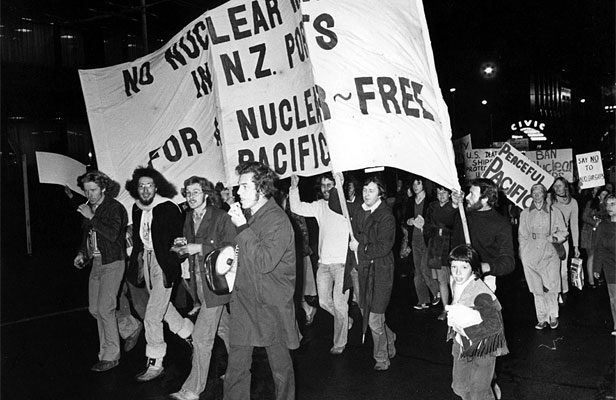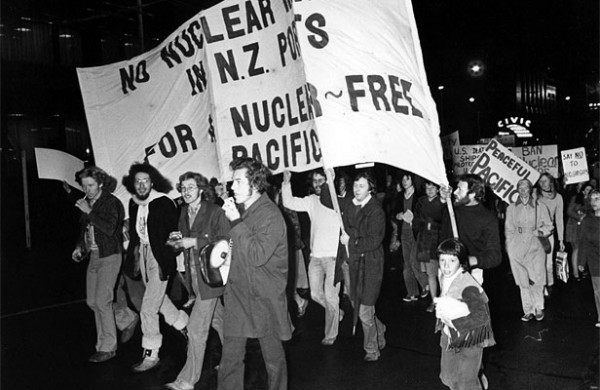Politicians, journalists and commentators who cannot understand why the TPPA marks the end of bipartisan support for similar international commerce agreements have missed the crucial point.
This is a nuclear-free moment in New Zealand’s history. It is a turning point. When New Zealand went nuclear-free in the 1980s with huge public support, it broke a previously bipartisan policy towards the US. The forces resisting change took to scaremongering to try to turn back the tide.
David Lange wrote in his memoirs: “The sum of the advice I received from the ministry … was that pursuing our nuclear-free policy would lead to a breakdown in New Zealand’s relationship with the United States… It could have severe economic consequences if the United States took action against New Zealand’s trade.” This echoed the blustering of opposing political and business leaders.
What did happen? Relationships changed. But the net damage was ruffled feathers. Instead it was ‘nuclear-free’ that became bipartisan policy because it made sense for New Zealand in a changed world.
That is how we should see this TPPA moment. All opposition political parties plus the Māori Party now firmly oppose it, along with a broad spectrum of society.
The TPPA is an agreement from the 20th century, not one for the 21st. It attempts to entrench the free-market trickle-down policies of the 1980s and 1990s. That is why conservative parties support it. It prevents future elected governments from making progressive change.
This is symbolised by National entrenching in the TPPA its policy of allowing investors from any country to buy our houses, no matter how much it pushes up prices. It has embedded its own government procurement policy. And so on.
These are the remnants of ideology from New Zealand in the 1980s and 1990s, Reaganism in the US and Thatcherism in the U.K. Agreements like the TPPA continue them when electors and international experience have rejected them. They ignore the most important issues of today.
These policies favoured the rich at the expense of the majority, creating a huge increase in inequality. Inequality is one of the top issues concerning people in New Zealand and internationally. Yet the TPPA is likely to increase income inequality according to at least one economic evaluation. It will increase inequality of power through provisions that allow overseas investors to sue governments for huge sums in unaccountable offshore tribunals of corporate lawyers if their profits are threatened.
The free-market policies directly led to the Global Financial Crisis that began in 2008 at enormous cost to the great majority of people. It was the latest and largest of a series of similar crises. Yet the TPPA does not help in the uncompleted task of reining in the banks and the rest of the financial sector. Worse, it removes tools that would enable governments to control the international movement of capital which rapidly spread the crisis. It continues an obsession with liberalising the financial sector, entrenching its ability to create “toxic” products and spread them across borders.
Does it deal with the biggest question of our time: climate change? No – it is unmentioned, and the ability the TPPA provides for corporations to sue governments could undermine actions against climate change. The environment chapter, experts are clear, is ineffectual window-dressing – as is the other nod to public concerns, the labour chapter.
And what is the pay-off? According to the study commissioned by the government itself, it is an increase of less than one percent of GDP in 15 years time: 0.9 percent. Even this tiny amount is strongly contested by economists. A few may well get most of it, increasing inequality.
Proponents will claim unquantifiable gains from greater international competition, increasing productivity. New Zealand’s recent history is not kind to that argument. Others (including Rod Oram and myself) will say it will just intensify our reliance on low-value commodities. The bottom line is that it embeds a theory of economic development which we have great cause to worry does not work.
Against concerns that the TPPA will cost sovereignty, the commentators protest that New Zealand lost sovereignty in previous agreements such as the WTO and with China. Why should we worry about losing more sovereignty now?
At what point do we say: no more? Because the end point is a central government with little more power than a town council.
This is a turning point in New Zealand’s history. The old guard complain it is not like we used to do it. But New Zealanders wisely learned the nuclear lessons leading up to the 1980s. All that we have learned since the 1980s leads to the stand that increasing numbers of citizens in New Zealand and other countries are taking on the TPPA and its like.
The TPPA is the wrong path to take for a fair, sustainable, secure and prosperous future.
Dr Bill Rosenberg is the CTU Economist and Policy Director







Spot on the mark.
That is how we should see this TPPA moment. All opposition political parties plus the Māori Party now firmly oppose it
Except that all opposition parties do not oppose the TPP.
The Labour party doesn’t oppose it, they just don’t support it as it stands.
Little will seek to “renegotiate” parts of it, even though he has now surrendered any bargaining muscle he had by declaring that Labour will not pull out of the agreement. His chance of successfully renegotiating any meaningful change is therefore probably close to zero.
So if he gets the chance to renegotiate and fails to win meaningful concessions, will Labour then pull out? or will Labour capitulate to the Neoliberal forces that set the deal up?
Given the party’s track record I wouldn’t bank on the latter.
Labour won’t pull out of the TPP – Little
http://www.radiolive.co.nz/Labour-wont-pull-out-of-the-TPP—Little/tabid/506/articleID/112603/Default.aspx
Listen from 3min 50
Labour under Little won’t pull out of the TPPA.
They’ll fight tooth and nail (and lose)
Given the party’s track record I wouldn’t bank on the
latterfirst.Fixed
At least Labour is prepared to fight, unlike rollover National. You should be more worried about National, Act, and UF ramming enabling legislation through parliament, that’s the biggest concern right now. Labour have come out and said they don’t support the TPPA in it’s current form, they never lied about that. The other opposition parties are not saying they will pull out either.
Labour, NZFirst and the Greens are on the same page, they all oppose the TPPA in it’s current form.
A Labour government has a way better track record of keeping their promises than the lying National government ever has.
chaff
There is a world-wide groundswell against neo-liberalism. Corbyn in the UK, Sanders in the USA, Trudeau in Canada, even an Australian senator. As someone said, ‘there is nothing more dangerous (or powerful) than an idea whose time has come!”
I would call it a movement towards trying to maintain nationalism where the real world actually functions globally. My family is intenational, my business is international and my friends who are NZ citizens live all over the world. Stop this nationalism now and start living in the world. Country and culture is redundant. They’ll have you fight wars using your patriotism soon. I see they are putting in a recrutment office at the new War fun park in Wellington.
The nation state is the unit of political accountability. Wanting a responsive and representative local democracy is not akin to invading Poland.
See what I mean. Right wing commentators are extremists. There just a couple pay brackets above Al Qaida’ that’s all.
“There is a world-wide groundswell against neo-liberalism.”
No there isn’t. And it’s curious that only one of the three leaders you name has actually won an election. Corbyn is already toast, and Sanders won’t be far behind.
Neoliberalism has already destroyed NZ, Key was the chosen one brought back to NZ to complete the Neoliberal Experiment.
Al Jazeera shown our treasonous PM as a leader in pushing the TPP. They even showed the pimp revelling in the announcement of the signing.
NZ political neutrality is in tatters.
‘The TPPA is the wrong path to take for a fair, sustainable, secure and prosperous future.’
Whilst that is true there is now no path to ‘a fair, sustainable, secure and prosperous future.’
The highly damaging policies pursued almost universally since the 1970s -when all the crucial factors that needed to be dealt with (but were not) were identified- have already caused so much damage there is no prospect of recovery. You cannot refreeze the Arctic or de-acidify the oceans. You cannot restore the messed up atmosphere to its pre-industrial condition or remove the cadmium that now contaminates NZ soils. You cannot unbuild cities (well not easily) and you cannot undo overpopulation (well not easily). The present system is, by definition, unsustainable since it is predicated on the mass consumption of fossil fuels, and is in the process of collapsing.
We now have a choice between a declining economy, a declining standard of living and declining environment under fascists (PPTA-style)….
or a declining economy, a declining standard of living and declining environment under some kind of more equitable governance.
The good news is that 2016 will be the year that changes everything.
The bad news is that most people are totally unprepared and in denial.
Good blog Bill,
This country needs to wake up bore we are totally overtaken.
The MSM is at the heart of spreading continuous propaganda about TPPA and never even sampled any overseas feedback from the grassroots to find as you show there is a groundswell against the TPPA and I video conferenced my buddies in Toronto at xmas to chat as Toronto was formerly my second home as a expat Kiwi and they are all against the TPPA there to so you are very right.
‘The environment chapter, experts are clear, is ineffectual window-dressing – as is the other nod to public concerns, the labour chapter.’
I am old enough to remember that is what radical Maori said about the Treaty of Waitangi.
It’s easy to discount those chapters, but they are there and can be mandated.
Remember – two lawyers stopped the All Blackss touring South Afica back in 1985 using this
‘ the decision [of the NZ Rugby Board to accept the invitation to tour South Africa] failed to comply with the object of promoting, fostering and developing amateur rugby union football throughout New Zealand, and that for various specified reasons it gives the game a tarnished and sullied image and will reflect adversely on the game’
Lawyers can tie anyone up in knots. So, as I say, the chapters are present and that’s all a (por bono!) lawyer needs.
Also, in terms of a big corporation sueing us in a court of law. There is always the good old-fashioned consumer boycott.
And if in your country (it is an international agreement) you can’t boycott the multi-national directly that is sueing your governemnt – target a secondary supplier to the multi-national and watch them start kicking up a stink.
Things got serious at FIFA when the spnsors started complaining!
This is not 1985.
The world has been severely messed-up since 1985. And NZ has been severely messed-up since 1985. Non-reversible damage has been caused and numerous tipping points have been passed as a consequence of the insane policies promoted under ‘Neoliberalism’.
Atmospheric CO2 has hit yet another all-time (within the context of human existence) high of 406ppm
https://www.co2.earth/daily-co2
and planetary meltdown is just beginning.
Later this year we will witness atmospheric CO2 in excess of 408ppm, maybe even 410pm (that’s 180ppm above the 800,000-year norm, by the way). And we will witness much higher levels next year.
How are lawyers going to be of any use in tackling that when city, district and regional councils and the government don’t even comply with present legislation and are fully committed to making everything rapidly worse?
Lawyers are now very much part of the problem.
As for consumers, over many decades they have been carefully trained by corporations to behave like idiots, and most of them do.
Exactly and the only way to deal with climate change, refugees, ocean acidification, species extinction, water shortages, waste etc etc is to start acting as a globe instead of lots of diffrent little countries. The EU is a good starting place.
Not a good example. The EU is a big flop and is a mess.
Look, obviously this is causing such great discord among the peoples of Aotearoa. However Chairman has the answer to all kerfuffle and confusion that is inflicting such angst on the people of NZ.
Extract from http://www.stuff.co.nz/national/politics/76649640/throwing-dildo-at-steven-joyce-appals-john-key
– Key said there was widespread support for the government and what was being done around the TPP trade treaty and the incidents at Te Tii Marae had not made him concerned about appearing in public elsewhere.
“I had a speech I was going to deliver at Waitangi this morning, which we actually decided to rewrite in the middle of this week this week which was really quite factual but reasonably straight forward – rebutting basically every single point that had been made by single person who had been opposed to the TPP.”
So, in essence, by this statement implies he has every answer to calm concerns, both Maori and non-Maori, relating to the contentious details in the TPP agreement, consequently settling this once, and for all.
Read us your speech John, so all New Zealanders can be relaxed about it.
Thank you, Bill.
The economic and political power is moving Eastward (and benevolence is the see able keyword). Once the take down of the Khazarian Zionist network has been completed there aint gonna be no players in the TPPA. Let’s hope we all remember to look after one another and keep our sights high while the puppet-masters behind the Key government are slowly taken down one by one – or – hopefully – in one glorious sweep of the sword! Little statements make big differences:
http://www.stage2omega.com/anti-vaccination-group-launches-amazing-new-billboard-for-superbowl/
Frankly, we are all catasrophy-ed pandemic-ed out.
Seems the pen may well indeed be mightier than the sword:
http://mainerepublicemailalert.com/2016/02/07/pope-francis-makes-a-law-destroys-every-corporation-in-the-world-2/
Common Sense dosen’t count in the modern neo liberal world.
Have to say again, the problem is, while the Maori party say they are opposed to the TPPA they continue to prop up the National government. They should disassociate themselves from National, just like they did with Labour over the foreshore and seabed issue, but this time they won’t, obviously their personal bank accounts would be substantially altered if they did so. The Maori Party have no mana. Words are cheap, and the Maori Party are not walking the talk.
“It prevents future elected governments from making progressive change.”
That is patently false. There is nothing in the TPPA that unequivocally prevents any future Government action because there is nothing preventing any future government withdrawing from the TPPA. And this is at the heart of Labour’s hypocrisy. They claim to be against the TPPA, yet they will not commit to withdrawing NZ from it. The reason is simple. By the time they are in government, the benefits of the TPPA will be obvious, and therefore the political cost of withdrawal too high a price to pay for principle.
There have been numerous cases overseas of corporations suing governments who attempted to implement progressive change.
One of the best know was Veolia sueing Egypt for increasing the country’s minimum wage – http://www.huffingtonpost.com/dave-johnson/corporate-courts—-a-big_b_5826490.html
The most recent, and closest, was Phillip Morris suing the Australian government for planning to introduce plain packaging for tobacco products.
So your assertion that it is “patently false” is, in itself, patently false.
You are either woefully ignorant of these matters or are being willfully disingenuous. I’m picking the latter, as no one could be so stupid as not to know about the Phillip Morris lawsuit.
“There have been numerous cases overseas of corporations suing governments who attempted to implement progressive change.”
1. Did any of those cases end in a win to the corporation?
2. Did any of those cases prevent a soveriegn nation exiting a free trade agreement?
Yes
Yes to Q1. or yes to Q2.?
By the way, Oxyood, your ACT/National spin for the TPPA is piss-poor weak. Claiming that ” by the time they [Labour] are in government, the benefits of the TPPA will be obvious, and therefore the political cost of withdrawal too high a price to pay for principle” is garbage.
MFAT have estimated that the TPPA will grow the GDP by a piddling 0.9% – by 2030!!
Not exactly something to crow about.
Try spinning it better.
In fact it is possible that NZ will have an election before the TPPA is ratified in all countries. So the benefits or costs will not be known. Instead the TPPA could become an election issue in NZ -with an incoming government declaring it will reverse some of the ratification clauses.
So if they can amend clauses, or for that matter withdraw completely, how is our sovereignty threatened?
Comments are closed.